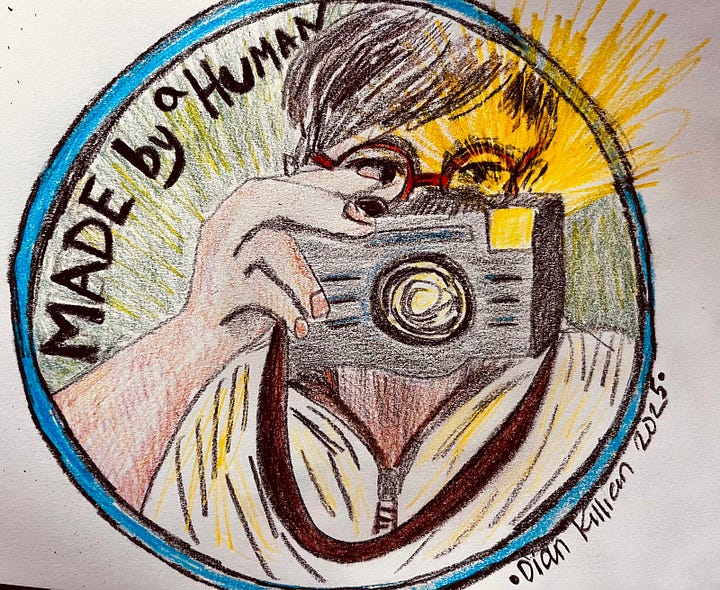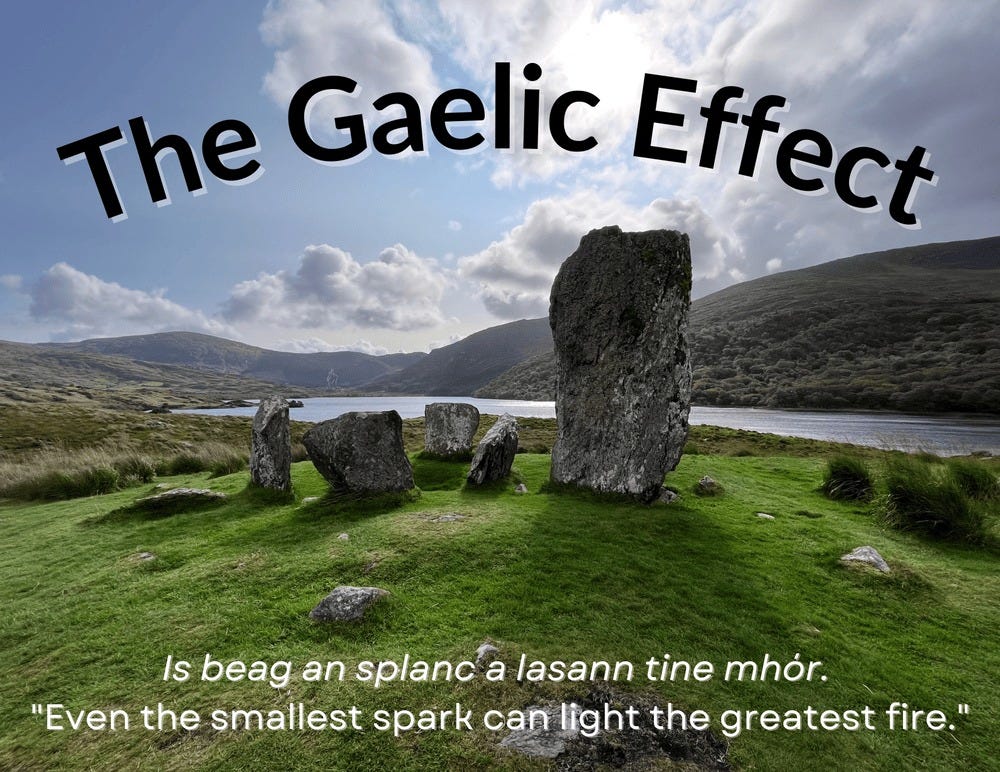Nóta (note): Read The Gaelic Effect in the Substack app for the best experience. And be sure to check out hyperlinks here: Irish words link to their pronunciation, key concepts go to more in-depth information, and key words after quotes go to citations. Happy delving!
Now…this week’s edition of The Gaelic Effect:
In Each of Us Gods, I explored how “hello” is a relational and generative blessing in Irish, with each person adding more goodwill. In Irish, you also don’t say, “I love you;” you express endearment in highly observational ways, grounded in the body and the natural/physical world: “You’re my treasure,” “…the pulse of my heart,” or “my heart is with/in your heart.” (See The Body Sings Electric.) Consistent with this pattern, there also is in Irish no profanity, vulgarity or “swear” words. Instead, there is a wealth of curses—also grounded in the natural world and, as with “hello” in Irish, recognizing liminality in how unseen (spiritual/psychic) forces interact with the physical/seen world. Irish curses also demonstrate a high value on relationality (or, in this case, the loss of it). Some might interpret the lack of vulgarity in Irish as prudishness. I don’t. I think it’s the opposite: indigenous Irish culture is so comfortable with physicality (including sexuality) that talking about it is not sufficiently taboo. Ultimately, curses reveal a continuous thread back to Bardic times when language was still seen as potent and magical—literally able to shape/change the world.
What’s taboo—rules
Swearing shows how dominant Christianity used to be in English speaking cultures. This is why to “swear” in English means both “to bind oneself by oath” (to solemnly give ones word) and “to use profane oaths or language.” In effect, “the earliest swear words…were taking the Christian God’s name in vain, or speaking of acts that were considered sinful.” (Dictionary.com ) To say something against God (“God damn it!”), or the son of God (“Jesus Christ!”)—in other words, to use “God’s name in vain,” was irreverent and unacceptable. Inherently, based on this tradition, swearing must have shock value; it’s profane because it’s taboo. The New York Times points out: “Swearing and cursing are often used interchangeably, but there's a subtle difference in their origins. A curse implies damning or punishing someone, while a swear word suggests blasphemy — invoking a deity to empower your words.” (NYT) As such, there’s a double meaning of “curse” in English as well; a curse is both “a prayer or invocation for harm or injury to come upon one” or “a profane or obscene oath or word“ (Merriam-Webster). The etymology of “profane” comes from Latin, meaning “outside the temple” or not sacred. (Oxford).
Profanity (at least in English-speaking cultures) now falls “into three basic categories: involv[ing] sexual references, […] objects of disgust—typically unpleasant bodily functions, and references to deity.” (Quora) What’s meant to be private, or is considered deviant, is profane. Within this context, in addition to bodily functions and sexual references, “degrading a man by calling him a woman, or gay (a man who has no interest in taking dominion over a woman), or just some part of a woman’s anatomy [is the] …cruelest thing we can do to a man, to view him with the contempt with which all women are viewed.” (Quora) Joseph Campbell pointed out that structural and cultural power in any period can be identified by looking at which buildings dominant the landscape; in the West at one point, it was churches and temples, then it became government buildings; today, it’s corporate headquarters. Inversely, profanity shows what’s vulgar, undesirable or disdained.
Close to the bone
In Irish, probably the best known insult is póg mo thóin (kiss my ass), thanks to The Pogues’ original name, Pogue Mahone, an Anglicization of the Irish phrase by James Joyce (they changed it to “The Pogues” after complaints from the BBC). There are other epithets, such as crabadán (a crabby or stunted person), bobarún or búbaire (a booby), and a dhiabhal de phogaí (damn kisses) (Irish Times). Yet these seem to be the outliers. What’s most common in Irish is curses and there’s an abundance of them. In fact, there’s a book, 500 Mallacht Ort (500 Curses on You), a title that sounds like a collection of witches’ spells.
While I haven’t read the entire book, Irish curses seem to fall into one of several categories: unpleasant and taboo topics to do with bodily functions (for example, Buinneach dhearg go dtigidh ort (That you may have red diarrhoea) or Snaidhm bundúin ort (May your anus be knotted); shunning or loss of connection with the community, for example, Náire agus aithis chugat (That you may be shamed and disgraced), Imeacht gan teacht ort (That you may leave without returning) or Go bhfaighir bás gan an sagart (I hope you die without a priest); psychological curses to do with loss of peace or mental well being, such as Lomadh an Luain ort (Woe betide you), Lagú cléibh ort (Weariness of heart upon you); Tuirse ort (That you may tire) or Briseadh agus brú ort (Strife and stress upon you). I especially find this last type poignant, suggesting the high value on equilibrium and peace of mind in indigenous Irish culture.
Go n-imigh na seacht diabhail deag atá i n-Ifrionn i’d dhiaidh.—May hell’s seventeen devils go after you.
Don’t mess with the devil
By far the most common categories though have to do with death and/or the supernatural. Regarding unpleasant ends, there are many: Mullach do chinn fút (That you may fall on your head); Go dtachtar le d’anáil thú (That you may choke on your breath), An áit thíos atá ceapaithe duit (It is the place below that is meant for you), Lá breá ag do chairde—dod adhlacadh (May your friends have a fine day—burying you); Droch chrích ort! (Bad ending upon you!), Gura féis ic faelaib do chorp! (May your body be a feast for wolves!) and, my personal favorite, Droch áird chúgat lá gaoithe (That you may be badly positioned on a windy day). If you’ve ever been near a cliff in Ireland in rough weather, this one is no joke.
Regarding the supernatural, a few include: Is ceann de’s na h-óinseacha diabhail thú (You are one of the Devil’s fools); (That the twelve devils take you with them); and Go n-imigh na seacht diabhail deag atá i n-Ifrionn i’d dhiaidh. (May hell’s seventeen devils go after you). Just as with céad míle fáilte (a hundred thousand welcomes), it seems that, when it comes to curses, one devil is not enough. When there is only one, he’s definitely up to no good: Go ndéana an diabhal dréimire do chnámh do dhroma (That the Devil will make a ladder out of your spine) or the Devil break your spine, your bones, or legs; prepare a fire for you; make splinters out of your legs; choke, kill, lacerate, or blind you; or blow you into the air. Some of these remind me of faeries—that can take you away, do other mischief or damage, including lifting you up into the wind. Once again, there is liminality: two different realms (that of physical reality and the super-natural) with each realm interacting with the other. (These similar activites between the devils and the fairies lead me to wonder what was said before Christianity, which basically made the pagan Gods into the devil.)
The art of the insult
Again, while there are some references to God in Irish curses such as Mallacht Dé ort—God’s curse upon you, and that one with the priest (see above, about loss of community), there are none that take God’s name in vain. There also are none to do with sexual acts, genitalia, or insulting women. Instead, the biggest taboos (least acceptable to talk about) are to do with death and the supernatural. Traditionally in Ireland it was seen as dangerous to talk too openly about the supernatural; you would not even risk mentioning the fairies by name—hence the euphemism and respect of referring to them as “the good people.”
Mallacht mo chait ort.—My cat’s curse upon you.
Regardless, why say ‘F-you!” when you can tell someone one of the many curses above? Given the power of the word historically in Irish culture (the Druids would not commit their word-knowlege to written form; the original Irish letters, the ogham, each named after a sacred tree) and that bardic curses were once very much feared, I would not take any curse in Irish lightly. In that tradition, curses also show off wit, humor and skill in a way that simply bad mouthing can’t. While some specific curses are popular, there are clearly patterns and room for innovation. In fact, there’s now a “curse engine” where you can choose different elements to create a new, custom mallaigh (curse). To enjoy this feat of tradition and modern technology, click here.
As always, thanks so much (GRMMA) for reading and subscribing (with special grá for paid subscribers) and sending you only warm wishes from as Baile Átha Cliath (Dublin). May you and all those you love be free from the seventeen devils as long as you live!
Dian
P.S. The week before St. Patrick’s Day I’ll be releasing GAEL-Stack—all things Celtic on Substack. If you know a Substack about Irish or Celtic history, language or culture, please post the link here so I can include it. Also, stay tuned about special offers for paid subscribers to The Gaelic Effect—ag teacht go luath (coming soon)!
You can also support The Gaelic Effect and its mission by making a one-time donation by clicking anseo (here).













This is fabulous. Den scoth. Grmma. Briseadh agus brú. The brokenness. And how do you cope with the brú when you are already briste?